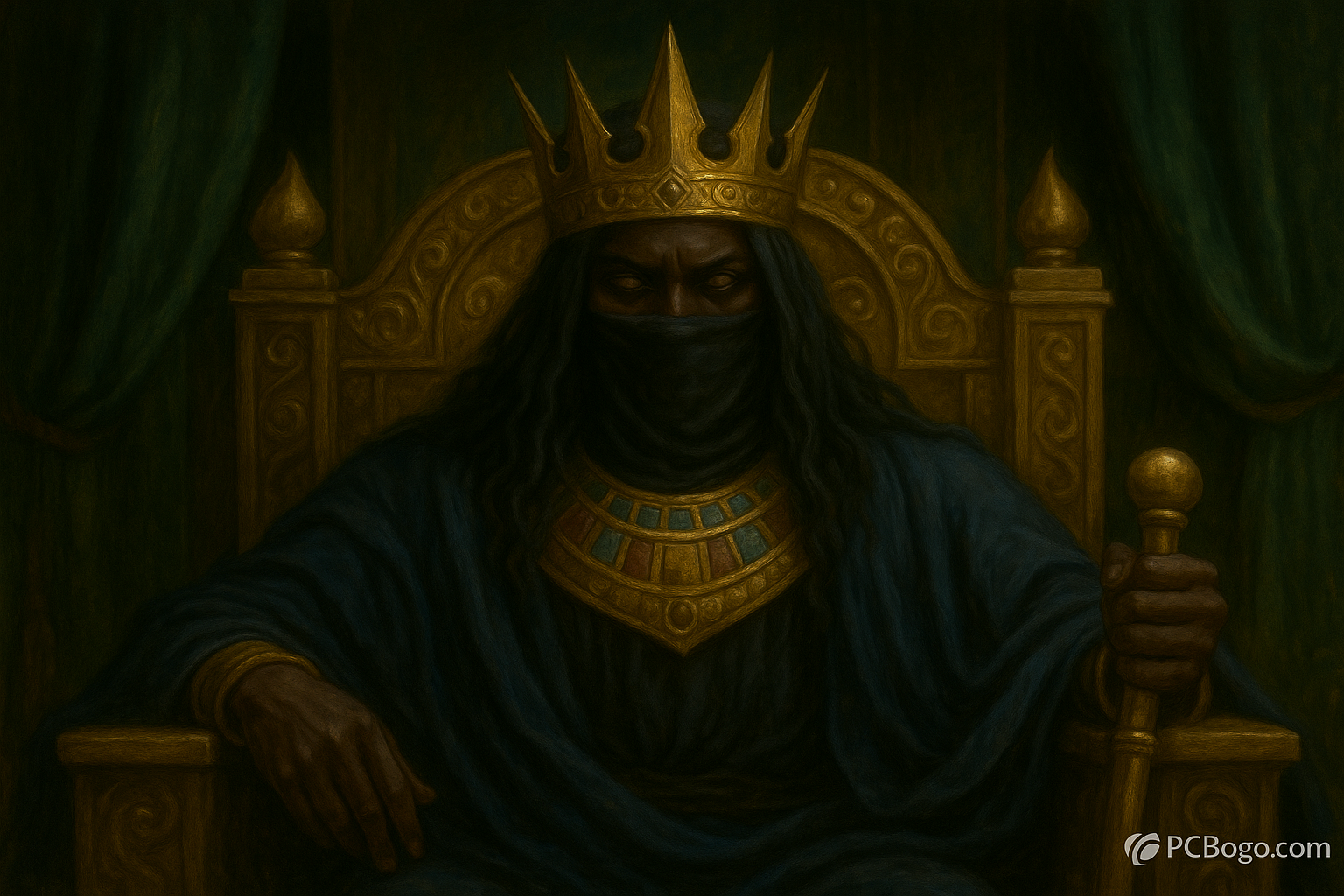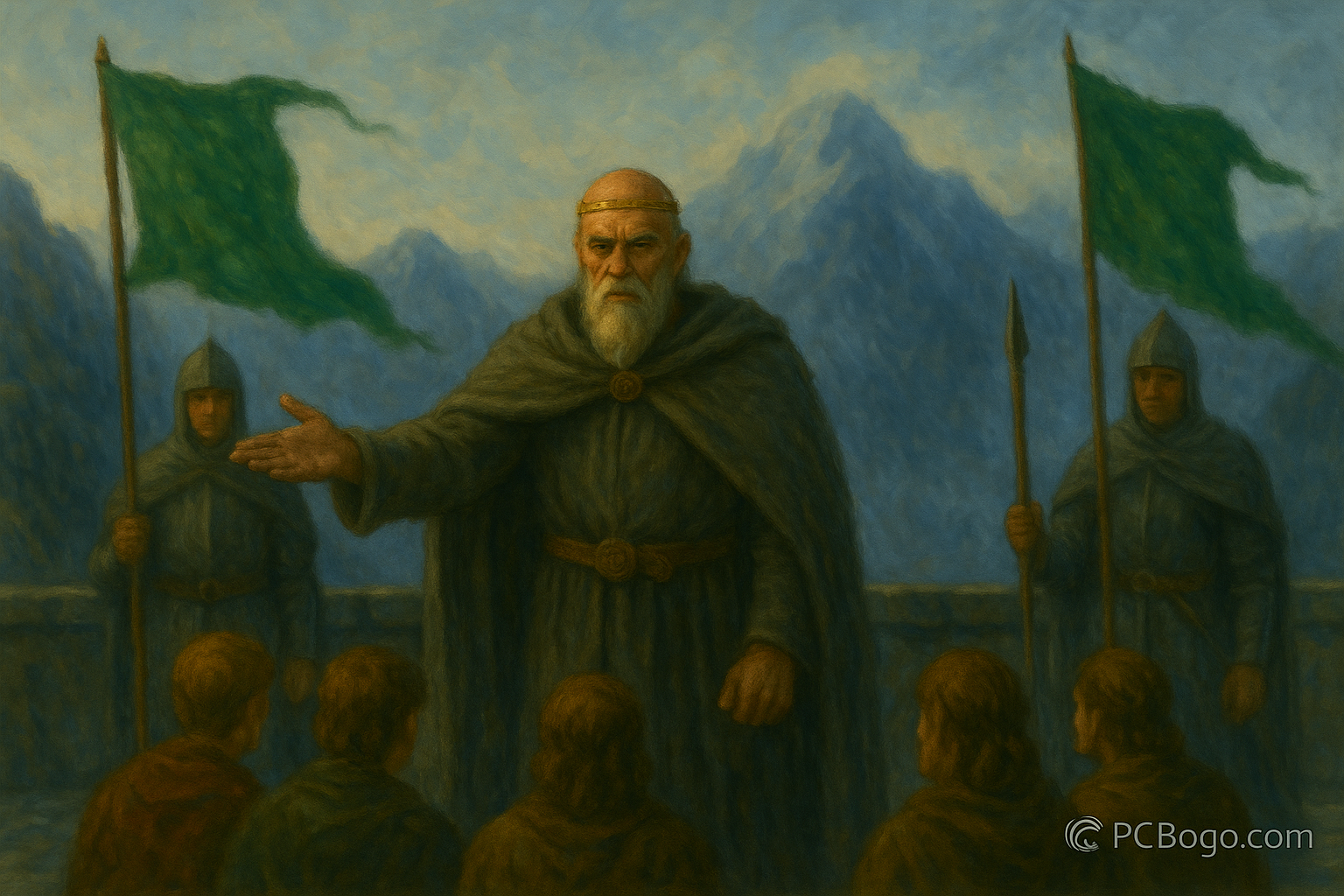第二章以「契約式的關懷」而非「安撫式的溫柔」為父女關係下註腳。父王(Father)戴德林(Dedelin)不只「為女兒感受」,更是「為女兒指派」。他的囑託要維溫娜(Vivenna)成為能讓國度存續的人——把情感轉譯為穩定,把猶疑轉化為禮儀,把恐懼收束為可靠的步伐。
對維溫娜(Vivenna)而言,這份囑託宛如一套沉默的作業系統:它校準她注意什麼、如何解讀、以及哪些衝動得以浮出。稱許被她讀成「承重的許可」,失望被她視作「修正姿態的指引」。就連他人的好意,她也會先評估是否有助義卓司(Idris),而非是否討她個人喜歡。
這套倫理高貴而易脆。到了哈蘭隼(Hallandren)——諸神宮廷(Court of Gods)以場面換取影響、復歸神(Returned)讓虔敬變得複雜、識喚術士(Awakeners)以彩息(Breath)通行——愛與權力的語法改以更鮮明的色彩書寫。若義務永遠高於親情,維溫娜(Vivenna)便有把「禮物」誤讀為「陷阱」、把儀式中的溫度誤判為操弄的風險。她的功課,是在不折損原則的前提下,讓感知變得更有彈性。
山德森(Sanderson)以圖像扣住主題:靠意志維持恆定的魔髮(Royal Locks),讓「責任」得以被看見;父王(Father)簡短而指令式的勸告,像一道口述的「命令(Command)」,在她身上「識喚(Awakening)」出一種使命,如同識喚術士(Awakeners)驅動布帛一般。於是,在維溫娜(Vivenna)身上,語言已經成為力量——先是治理自己,接著,也許能在權力交涉的房間裡發揮作用。
因此,「父王的囑託」不是結論,而是成長的邀請。義務是否必須壓過親情,或能學會庇護親情,將決定維溫娜(Vivenna)的軌跡。無論前方是誰去誰留、角色如何轉換,她已準備好扛起重擔;第二章留下的追問,是——在扛起重擔的過程裡,她將被如何改造。
Family Strains: Subtle Emotions Between Sisters
Sisterhood in Chapter Two is drawn as a quiet asymmetry: Vivenna organizes affection through duty, while Siri seeks warmth through spontaneity. The same household rules produce different literacies of love. Where Vivenna reads expectations as trust, Siri hears them as distance and answers with improvisation. The result is a bond that is close in origin, but misaligned in method.

Vivenna’s gaze on her younger sister is protective and exacting at once. She wants Siri safe and, just as crucially, dependable—capable of reflecting well on their house and on Idris. Discipline is Vivenna’s love language; composure is the gift she keeps trying to give on her sister’s behalf. The Royal Locks become emblem and test: a visible metric by which Vivenna proves—to herself as much as to others—that feeling can be governed.
Siri’s counter-reading is more immediate. She experiences care as attention rather than assignment, so she tests boundaries to see whether anyone will reach past the rules to meet her. Mischief is not sabotage but inquiry: Will you still come closer if I color outside the lines? The friction this creates is not hatred but a plea for recognition in a grammar Vivenna rarely speaks.
The sisters mirror their nation’s tension between restraint and color. Vivenna embodies austerity, the ethic that keeps small kingdoms alive; Siri anticipates a world where display and delight carry social meaning. Neither stance is simply right or wrong—they are two answers to the same pressure, shaped by birth order, temperament, and the family’s chosen way to survive.
Sanderson lets this subtle dissonance hum beneath the plot. The affection is real; the translation layer is faulty. Chapter Two leaves the sisters poised on a hinge: if circumstances shift and duty is reassigned, their differing grammars of love will decide whether the bond stretches and holds—or tightens and snaps.
The sisters’ history is a ledger of mismatched translations. Vivenna catalogs moments as lessons—what a misstep taught, how a boundary protects—while Siri remembers the same scenes as tests of whether anyone would cross the boundary to reach her. The facts are shared; the meanings diverge. In that divergence, affection often arrives late or in the wrong language.
Dedelin’s household reinforces the split. Vivenna is groomed as standard-bearer, the child who proves that Idris’s ethic can be lived; Siri is the relief valve through which the family’s pent-up warmth occasionally escapes. This is less favoritism than system: one daughter receives attention as assignment, the other as correction. Each grows fluent in a different grammar of love.
Because their literacies differ, their communication misfires in predictable ways. Vivenna offers prescriptions—how to stand, how to speak, how to still the Royal Locks—believing that composure is a gift. Siri wants presence before instruction; advice feels like distance. When Vivenna asks for steadiness, Siri hears conditional acceptance. When Siri asks to be seen, Vivenna hears a plea to abandon the very discipline that keeps them safe.
The political weather amplifies the friction. With Idris threatened and Hallandren looming, the house has little bandwidth for experiments in tenderness. Vivenna’s sense of urgency hardens her tone; Siri’s improvisation escalates as she looks for proofs that love can bend before it breaks. What might have been a private sibling drama is drafted into national service.
Sanderson stages this quietly, letting the dissonance hum under the plot. The question the chapter plants is not whether the sisters care but whether they can translate. If circumstance reassigns duty, will they inherit each other’s vocabulary—Vivenna learning warmth without forfeiting discipline, Siri learning form without losing her spark? The hinge of their bond is already in motion.
The bond between the sisters is laced with admiration edged by worry. Vivenna recognizes Siri’s brightness—the quick humor, the ease with people, the instinct to turn a room toward delight—but she fears the cost of such spontaneity in a household calibrated for caution. What looks like lightness to Siri looks like liability to Vivenna, and that difference quietly abrades affection.
Vivenna’s attempts at care arrive as prescriptions. She offers postures to adopt, words to avoid, even the mental routines that keep the Royal Locks steady. These are not meant as rebukes; they are her way of giving what she values most—composure. But instruction is a poor substitute for presence. Siri hears advice as judgment, and the exchange that was meant to soothe only sharpens the sense of being managed.
Siri’s bids for closeness are misread as mischief. Skipped lessons, late returns, a joke made too loudly—these are tests, not attacks: Will you meet me where I am? Will you see me without first correcting me? Vivenna, trained to translate disorder into risk, answers with stricter boundaries, proving again that love in this house is a function of steadiness.
Birth order fixes the symbolism. The elder sister is the emblem of Idris: narrow, high, restrained; the younger anticipates a world more like Hallandren—color-forward, pleasure-literate, suspicious of austerity as a virtue. The tension is not a simple clash of right and wrong but a negotiation between two survival strategies, each coherent within its own frame.
Sanderson keeps the dissonance quiet, staging it through glances and small corrections rather than open quarrel. Because the chapter filters Siri through Vivenna’s point of view, readers feel both the love and the distortion. The result is a fragile intimacy: strong enough to hold history, vulnerable to the next reassignment of duty.
Chapter Two stages sisterhood in micro-gestures: a paused answer, a redirected glance, the Royal Locks held a shade too steady. In this household, silence carries as much meaning as speech. What the sisters cannot say outright—need, fear, envy—travels through timing and tone, through how long a gaze lingers and how quickly it looks away.
Vivenna’s love often arrives camouflaged as coaching. She corrects because she worries, and she worries because she imagines consequences beyond the room: reputation, leverage, the kingdom’s precarious calculus. In her logic, to shape Siri is to shield her. Yet containment offered as care risks being received as control, and control, however well-meant, corrodes intimacy when it is constant.
Siri answers with brightness that doubles as defense. Jokes, lateness, harmless defiance—each is a bid for unmediated closeness, a test of whether anyone will cross the rulebook to meet her as she is. She admires Vivenna’s competence even as she resents being measured by it, so she manufactures lightness to win space where she can breathe without being assessed.
The sisters are written as complementary foils. Vivenna supplies structure to a family that survives by restraint; Siri supplies color to a world that is in danger of forgetting delight. Read together, they sketch two literacies their country will need in Hallandren: the ability to negotiate spectacle at the Court of Gods and to interpret economies of Breath without surrendering moral gravity.
Thus the chapter hums with possibility as much as friction. If circumstance forces a change in duty, the bond could tighten or break on the same hinge: Vivenna learning to offer presence before prescription, Siri learning to translate warmth into reliability. The affection is there, waiting for a common grammar.
Chapter Two treats sisterhood not as a problem to solve but as energy to be converted. What divides the sisters—Vivenna’s steadiness and Siri’s brightness—can also complete them: two lenses for reading a world that will soon demand both caution and imagination. Each holds the skill the other will need.
The work ahead is translational rather than corrective. For Vivenna, care must learn presence before prescription; for Siri, warmth must learn to carry weight. If Vivenna can offer steadiness without erasing spontaneity, and if Siri can turn delight into reliability, their differences will become assets rather than abrasions.
Sanderson binds this hope to symbol. The Royal Locks, so carefully held neutral, are a seismograph for strain—but also for growth: small shifts can register new forms of courage. Likewise the cultural map—Idris’s austerity, Hallandren’s color, the Court of Gods, the commerce of Breath—becomes a stage on which each sister’s literacy can broaden without betrayal.
Narratively, the bond gives geopolitics a human pulse. Treaties, borders, and divine pageantry matter because they press on a fragile intimacy. If duty is ever reassigned, the sisters’ ability to inherit each other’s grammar—structure from one, spark from the other—will determine whether their loyalty expands or calcifies.
Thus the chapter closes with a double invitation. To Vivenna: keep faith with duty while widening interpretation. To Siri: keep faith with joy while learning form. The hinge between them is already turning, and the novel’s promise is that sisterhood, rightly translated, can carry a kingdom.
家庭的裂痕:姊妹之間的微妙情感
在第二章中,姊妹關係被描繪成一種安靜的不對稱:維溫娜(Vivenna)以「責任」來組織情感,希麗(Siri)則以「即興」來尋找溫度。同一套家規,生成了兩種不同的「愛的識讀」。維溫娜(Vivenna)把期待讀成信任;希麗(Siri)卻把期待聽成疏離,並以即興回應。於是,這段從同一起點出發的情誼,因方法的不同而產生偏差。
維溫娜(Vivenna)對妹妹的注視,既保護也嚴苛。她希望希麗(Siri)安全,更希望她「靠得住」——能為家族與義卓司(Idris)爭光。紀律是維溫娜(Vivenna)的「愛的語言」;沉著,是她屢屢替妹妹想要贈與的禮物。魔髮(Royal Locks)在此成為象徵與測驗:透過可見的髮色穩定度,維溫娜(Vivenna)向他人、也向自己證明——情感可以被治理。
希麗(Siri)的反讀更為直接。她把「被關愛」理解為「被關注」,因此總以越界來試探:是否有人願意跨過規則,靠近她?在她的邏輯裡,頑皮並非破壞,而是發問——「若我把線條塗出格,你仍會走近我嗎?」這種摩擦不是憎惡,而是以維溫娜(Vivenna)少用的語法,向家人提出「看見我」的請求。
兩姐妹也映照出國度層面的拉扯:維溫娜(Vivenna)體現節制,這種倫理讓小國得以存活;希麗(Siri)則預示另一個世界——在那裡,張揚與愉悅(如哈蘭隼 Hallandren 的社會氣質、諸神宮廷 Court of Gods 的華麗場面、彩息 Breath 帶來的鮮活性)擁有社交意義。二者並非絕對的是非,而是對同一壓力的不同回應,受出生序、性情與家庭求生方式所塑形。
山德森(Sanderson)讓這層細微的不協,悄悄在劇情下方嗡鳴。情感是真實的;出問題的是「翻譯層」。第二章把兩人安置在鉸鏈上:若情勢一變、義務重分,她們對「愛」的不同語法,將決定這段關係是被拉伸後仍能承載,還是拉緊到斷裂。
兩姊妹的成長史,像一本「翻譯失準的帳冊」。維溫娜(Vivenna)把往事記作「課程」——失誤教了什麼、界線如何保護——而希麗(Siri)則把同樣的場景記成「試探」:是否會有人跨過界線來擁抱她?事實相同,意義各異;也因此,親情常常遲到,或以錯誤語言抵達。
父王(Father)戴德林(Dedelin)的家教,強化了這道差縫。維溫娜(Vivenna)被培養為「持準之人」,用來證明義卓司(Idris)的倫理可被真正活出;希麗(Siri)則像把家中壓抑的溫度偶爾釋放出去的「洩壓閥」。這不是偏心,而是系統:一個女兒以「指派」為關注,另一個女兒以「糾正」為關注;於是兩人分別熟練了兩種不同的「愛的語法」。
語法不同,溝通便按同一規律失真。維溫娜(Vivenna)遞出的,是「處方」——如何站、如何說、如何讓魔髮(Royal Locks)維持穩定——她以為沉著是最好的禮物;希麗(Siri)要的是「在場」先於「指導」,因此忠告聽來像是更遠的距離。當維溫娜(Vivenna)要求「穩定」,希麗(Siri)聽成「有條件的接納」;當希麗(Siri)要求「被看見」,維溫娜(Vivenna)則聽成「請你放棄保障我們安全的自律」。
政治氣候把這份摩擦放大。義卓司(Idris)受威脅、哈蘭隼(Hallandren)在側,家裡幾乎沒有餘裕進行「溫柔的實驗」。維溫娜(Vivenna)的急迫感使語氣更硬;希麗(Siri)則以更頻繁的即興行動,尋找證明——愛能在斷裂前先彎曲。原本屬於私領域的姊妹拉扯,於是被徵召進了國族的服務。
山德森(Sanderson)選擇以低鳴方式呈現,讓不協和音在劇情之下延續。這一章提出的問題不是「她們是否相愛」,而是「她們能否翻譯」。若情勢真的重分義務,她們是否能承接彼此的詞彙——維溫娜(Vivenna)學會在不丟失紀律的前提下給予溫度,希麗(Siri)學會在不熄滅火花的前提下擁抱形式?她們關係的鉸鏈,已悄然開始轉動。
兩姊妹的情誼,混合了「欣賞」與「憂慮」。維溫娜(Vivenna)看見希麗(Siri)的亮度——反應機敏、擅長與人相處、能把一個房間的氣氛翻轉為愉悅——卻擔心這種即興在一個以謹慎為校準的家庭裡會付出代價。對希麗(Siri)而言的輕盈,在維溫娜(Vivenna)眼中卻是風險;這層差異,悄悄摩損了彼此的親密。
維溫娜(Vivenna)表達關懷的方式,常以「處方」到達。她提供該採取的姿勢、該避免的措辭,甚至給出維持魔髮(Royal Locks)穩定的心智訓練。這一切並非責備,而是她獻出自身最珍視的禮物——沉著。然而,「指導」無法取代「在場」。在希麗(Siri)耳裡,建議等同於評判;原意為安撫的交換,反而加深了被管理的感受。
希麗(Siri)向家人遞出的「求靠近」訊號,經常被讀成「惡作劇」。逃課、晚歸、玩笑說得太大聲——這些舉動是試探,而非攻擊:你願意在我所在之處與我相遇嗎?你能在糾正之前先看見我嗎?維溫娜(Vivenna)受訓於「把混亂翻譯為風險」的思考,於是回以更嚴密的界線,再次證明在這個家裡,「愛」與「穩定」被綁在一起。
出生序替二人固定了象徵。姊姊像義卓司(Idris):地勢狹峻、調性高冷、以節制為美德;妹妹則預示另一種世界,更接近哈蘭隼(Hallandren):色彩為先、懂得愉悅、對「清苦即是德性」心存質疑。緊張關係不是非黑即白的對錯,而是兩種求生策略之間的協商,各自在其框架內自洽。
山德森(Sanderson)讓這股不協,以目光與小小的糾正來呈現,而非以爭吵爆發。由於本章多以維溫娜(Vivenna)的視角濾過希麗(Siri),讀者同時感受到愛與失真。結果是一種脆弱的親密:足以承載過往,卻也可能在下一次「義務重分」時,因翻譯落差而受損。
第二章以「微動作」來鋪排姊妹情誼:半拍遲疑的回應、移開的眼神、被維持得過於穩定的魔髮(Royal Locks)。在這個家裡,沉默與話語同等有力。那些無法直說的欲求、恐懼與微嫉,改以節奏與語氣流動——停留多久、又多快移開視線,都在傳情。
維溫娜(Vivenna)的愛,常以「指導」的樣貌現身。她糾正,因為她擔憂;她擔憂,因為她腦中總有房外的後果:名聲、籌碼、與國度的微妙平衡。依她的邏輯,「塑形」就是「保護」。但當「框住」被當作「關愛」長期輸出時,接收者容易將之解讀為「控制」;而控制,即使出於好意,也會在持續的頻率下侵蝕親密。
希麗(Siri)以亮度作為回應,也作為防禦。玩笑、遲到、看似無傷的大膽——每一次都是一種「不經轉譯的靠近」邀請,測試是否有人願意跨過規則,直面她的樣子。她欽佩維溫娜(Vivenna)的能幹,同時也厭煩被拿來比量;於是她「製造輕盈」,為自己開出一個不被審核就能呼吸的空間。
兩人被寫成彼此補位的對照。維溫娜(Vivenna)提供結構,讓靠節制存活的家庭不致鬆散;希麗(Siri)提供色彩,叫一個容易忘記喜悅的世界仍記得歡愉。並置來看,她們預演了義卓司(Idris)面對哈蘭隼(Hallandren)時所需的雙重素養:在諸神宮廷(Court of Gods)的華麗場面中談判、在彩息(Breath)的經濟語境裡解讀動機,而不拋下道德的重量。
因此,本章既有摩擦,也滿是可能。一旦情勢改變、義務重分,這段關係會在同一處鉸鏈上要麼收緊、要麼斷裂:維溫娜(Vivenna)學會在處方之前先給「在場」,希麗(Siri)學會把溫度翻譯成「可倚賴」。她們的感情始終存在,只待一套能共通的語法。
第二章並未把姊妹情誼視為待修理的「問題」,而是視為可轉化的「能量」。將兩人分隔的因素——維溫娜(Vivenna)的穩定與希麗(Siri)的明亮——其實也能使她們互補:在即將到來的局勢裡,世界同時需要謹慎與想像;而她們各自握有對方未來所需的能力。
下一步的功課是「翻譯」,而非「糾正」。對維溫娜(Vivenna)而言,關懷要學會在「處方」之前先給予「在場」;對希麗(Siri)而言,溫度要學會承載份量。若維溫娜(Vivenna)能在不抹除即興的前提下提供穩定,若希麗(Siri)能把愉悅轉譯成可靠,那麼差異就會從磨損,變成資產。
山德森(Sanderson)以象徵扣住這份盼望。被悉心維持中性的魔髮(Royal Locks)如同「張力地震儀」:它不只記錄壓力,也能記錄成長——細微的色變,可能是新勇氣的誕生。同樣地,文化地圖——義卓司(Idris)的樸素、哈蘭隼(Hallandren)的繽紛、諸神宮廷(Court of Gods)的場面、以及彩息(Breath)所驅動的經濟——也將成為舞台,讓兩人的「閱讀力」擴展而不必背離本心。
在敘事層面,姊妹之情替地緣政治裝上了心跳。條約、邊境與神性的華麗皆因此而重要——因為它們壓迫著一段脆弱的親密。倘若義務真的重分,兩人是否能承接彼此的語法——從姊姊那裡繼承結構,從妹妹那裡繼承火花——將決定她們的忠誠是擴張開來,還是硬化收縮。
因此,本章以「雙重邀請」收束:對維溫娜(Vivenna)而言,是在忠於責任的同時擴大解讀的幅度;對希麗(Siri)而言,是在忠於喜悅的同時習得形式的支撐。連接她們的鉸鏈已然轉動,而小說也隱隱許諾:若翻譯得法,姊妹之情足以承載一個王國。
Faith of Idris: Resistance and Adherence Against Breath
Idris’s faith is built on restraint. Piety is measured not by spectacle but by self-limitation—muted cloth, plain ceremony, and a suspicion of power that looks too easy. BioChromatic Breath, in this ethic, is not neutral energy but morally entangling capital: to accumulate or trade it risks turning persons into instruments. Holiness, for Idris, is the refusal to make the soul a commodity.

This posture creates a theological map. Awakening is distrusted as an attempt to bend creation through shortcuts of will and word; the Returned complicate devotion by making divinity visible and transactional; Lifeless seem a desecration of the boundary between life and death; and the Heightenings read as spiritual indulgence—pleasure dressed as enlightenment. Such convictions are memory-work too, formed by exile and the long shadow of earlier wars.
An ethic becomes an economy. If Breath can be bought and sold, Idris worries that value will migrate from character to currency. Those who part with their Breath—drabs—become a living cautionary tale, and children are taught a language of modesty that resists spectacle. Even royal bodies participate: the Royal Locks are trained to neutrality, making composure a public liturgy.
Faith also functions as a border. By defining itself against Hallandren—its color, its pageantry at the Court of Gods, its acceptance of Awakeners as craftsmen—Idris preserves a small nation’s cohesion. Dedelin’s policies live inside this frame; treaties are hedges, and distance is a kind of devotion. The stance is spiritual, but it is also strategic.
For Vivenna, this creed is formation, not theory. It furnishes her instincts: to read Breath as hazard, display as seduction, and compromise as the first slide toward assimilation. As Chapter Two sets her on a path toward Hallandren, Idris’s faith becomes both anchor and constraint—the measure by which she will interpret, and misinterpret, the world she must enter.
Idris’s creed is a moral aesthetics: holiness is rendered in muted tones, straight lines, and the refusal of easy power. The doctrine does not merely say “do not trade Breath”; it teaches that power acquired without toil distorts the soul’s posture. Beauty is simplicity; authority is patience; and spiritual health is measured by how little one needs, not how much one can command.
From creed to custom, the translation is precise. Clothes avoid saturated color; architecture prefers clean planes and narrow ornament; ceremonies are short, intelligible, and serious. Children learn stories in which restraint saves villages and spectacle invites ruin. The drab is not a monster but a parable: a living reminder that to spend one’s Breath is to mortgage one’s dignity, even if survival sometimes forces hard bargains.
This ethic regulates language as well as behavior. In Idris, careful speech is virtue: promises are few and kept, exaggeration is suspect, and flattery is counted as the first cousin of manipulation. Even the religious vocabulary tilts away from immediacy; Awakening is framed as an art of shortcuts, Commands as presumptuous imperatives, and Heightenings as a gilding of appetite under the name of insight.
Socially, the creed inverts prestige. In Hallandren, display buys status; in Idris, modesty does. A family admired in the high valleys is one whose table is plain, whose word is heavy, whose children can hold the Royal Locks steady in public. Wealth is not denied but domesticated: it must be quiet, useful, and hard to notice—an economy of decency rather than spectacle.
For Vivenna, this world is the water she swims in. Her instincts in Chapter Two—distrusting commerce in Breath, bracing against theatrical piety, organizing feeling under duty—are not personal quirks but communal formation. As she moves toward Hallandren, the very grammar that kept her upright may also narrow her reading of a city where color is a language and display a currency. The test before her is interpretive as much as moral.
Idris’s suspicion of Breath is not superstition but an anthropology of the soul. Breath signifies personhood; when it becomes currency, persons risk becoming instruments. In this moral calculus, the drab is a living parable of loss, the Lifeless a breach in the boundary between life and death, and the practice of Awakening a technique that tempts humans to treat creation as compliant material. The anxiety is less about magic than about the uses to which people are put.
This theology trains perception. Vivenna’s first heuristics read Awakeners as artisans of manipulation, the Court of Gods as a theater where visible divinity invites idolatry, the Heightenings as pleasure gilded with the rhetoric of insight. Such judgments are coherent within Idris’s frame: when power is easy, it is suspect; when color commands attention, it distracts from character; when Commands move cloth and rope, they may also move consciences.
Yet refusal can be a kind of power. By declining Breath-trade and spectacle, Idris accrues moral capital: the freedom to say no becomes leverage in negotiations, and simplicity reads as integrity. But this stance carries costs. A people trained to distrust gifts may misread generosity as entrapment, and a princess trained to avoid compromise may overlook alliances that would preserve the very virtues she serves.
Customs embed the creed in ordinary time. The royal household rehearses restraint as public liturgy—muted dress, brief ceremonies, careful speech, and Royal Locks held steady in the marketplace. Even language is regulated: Commands belong in prayer or law, not as casual instruments for reshaping the world. The point is formation, not display; the measure is steadiness, not shine.
Narratively, this faith sets Vivenna up for an interpretive trial. As she approaches Hallandren, she will meet counterexamples: Awakeners who serve rather than exploit, Returned whose ministries complicate simple dismissals, uses of Breath that heal rather than dominate. The question is not whether Idris’s ethic is wrong, but whether it is complete—and whether Vivenna can keep the core while revising the perimeter.
Idris’s faith doubles as border policy and soft power. By defining holiness as restraint and treating Breath-commerce as moral hazard, the kingdom converts renunciation into cohesion. Dedelin can negotiate from a posture of principled scarcity, claiming credibility precisely because Idris refuses what others pursue. What Hallandren reads as stubbornness, Idris names integrity.
Mechanisms make the creed durable. Social honor accrues to muted dress and unornamented rooms; public life is paced by brief rites and careful speech; children learn to treat impulse as something to lace with discipline. The Royal Locks, held deliberately neutral, function as a daily liturgy—an embodied reminder that visible power should submit to inward governance.
The theology furnishes cautionary tales. Drabs become parables of diminished dignity; Lifeless mark a contested boundary between life and death; Heightenings are taught as indulgence polished to look like insight; the Returned complicate devotion by placing divinity on display. These narratives cultivate vigilance, but they can also normalize suspicion to the point that generosity reads like bait.
Diplomatically, Idris’s creed creates a translation gap. Hallandren’s Court of Gods treats spectacle as a lever for influence and Awakeners as artisans whose craft oils the city’s commerce. Signals that mean “goodwill” in one grammar can be heard as “corruption” in the other. Without interpreters—moral and cultural—both sides risk talking past each other while believing they have spoken plainly.
For Vivenna, the creed is both anchor and limit. It steadies her against seduction and equips her to say no when others cannot. Yet Chapter Two also hints that survival in Hallandren will require a refined reading: keeping Idris’s core while learning to discern grace beneath color and Breath. The trial ahead is not to abandon faith but to deepen it until it can tell display from deception.
Chapter Two closes by presenting Idris’s faith as a living discipline rather than a static taboo. Its refusal of Breath-commerce, its caution toward Awakening, and its skepticism about visible divinity are not mere negations; they are practices aimed at keeping a people clear-eyed and free from easy coercion. The ethic guards the soul by teaching it to want less and to watch more.
Yet the same ethic must learn to travel. In Hallandren, where color speaks and ceremony persuades, a virtue that never translates risks hardening into self-regard. What began as humility can slide into pride disguised as purity; suspicion can mistake grace for bait. The test ahead is whether Idris’s creed can grow supple without losing spine—reading display without surrendering to it, and receiving gifts without becoming indebted in spirit.
For Vivenna, this becomes an interpretive vocation. She will need to distinguish between exploitation and craft among Awakeners, between pageantry and power at the Court of Gods, and between appetite and insight within the Heightenings. The point is not to abandon the Idris grammar but to enlarge its vocabulary, so that caution can recognize goodness when it comes clothed in color.
Sanderson ties this prospect to image and language. The Royal Locks—held steady by will—suggest a faith capable of visible restraint; the novel’s language of Command and Awakening hints that words can form more than cloth, shaping conscience as well as canvas. If Breath can animate matter, perhaps conviction can animate mercy. The question is whether Vivenna’s formation can house both.
Thus the chapter leaves Idris’s faith poised between anchor and sail. As a nation’s conscience, it steadies a small kingdom against seduction; as a personal discipline, it prepares Vivenna to say no where others cannot. Its future strength, however, will depend on its capacity to say a discerning yes—one that keeps integrity intact while letting understanding widen. That wager becomes the spiritual arc that propels Vivenna into the brighter world ahead.
義卓司的信仰:對彩息的抗拒與堅持
義卓司(Idris)的信仰奠基於「克制」。虔誠不以鋪張來衡量,而以自我節制為準——素淨的衣料、簡樸的典禮,並對過於輕易取得的力量保持戒心。依此倫理,生體彩息(BioChromatic Breath)並非中性的能量,而是牽涉道德的「資本」:凡是累積或交易它,皆有把人格變成工具的風險。對義卓司(Idris)而言,「聖」就是拒絕把靈魂商品化。
這種姿態構出一張神學地圖:識喚(Awakening)被質疑為以意志與言詞走捷徑去扭動受造界;復歸神(Returned)讓虔敬變得「看得見且可交易」;死魂僕(Lifeless)被視為打破生死邊界的褻瀆;而彩息增化(Heightening)則像是披上啟蒙外衣的感官享樂。這些信念同時也是記憶工程,源於流亡史與過往戰事的陰影。
倫理會變成經濟。若彩息(Breath)可以買賣,義卓司(Idris)便憂慮價值會從「德性」轉移到「貨幣」。那些交出彩息(Breath)的人——褪息之人(drab)——成了活生生的警世寓言;孩童自小學習一種抵抗鋪張的「素淡語法」。就連皇族的身體也被捲入:皇室特徵的魔髮(Royal Locks)被訓練為中性,讓「沉著」成為公開的禮儀。
信仰同時也是邊界政策。透過把自己與哈蘭隼(Hallandren)區分——其繽紛、其諸神宮廷(Court of Gods)的場面、其把識喚術士(Awakeners)當作匠人的日常——義卓司(Idris)維繫了小國的凝聚。戴德林(Dedelin)的治術正是在這個框架內運作:條約是保險,距離也是一種虔誠。這份立場既屬屬靈,也屬策略。
對維溫娜(Vivenna)來說,這套信念不是抽象理論,而是「性格的塑形」。它提供她的直覺:把彩息(Breath)視為風險、把張揚視為誘惑、把妥協視為同化的開端。當第二章推動她踏向哈蘭隼(Hallandren)時,義卓司(Idris)的信仰既是錨,也是框——它將成為她理解、甚至誤讀那個世界的尺度。
義卓司(Idris)的信仰是一種「道德美學」:以素淡為美、以筆直為正、以拒絕唾手可得的力量為聖。教義不只說「不可交易彩息(Breath)」,更主張「不勞而獲的權能會扭曲靈魂的姿態」。於是,美即簡樸、權威即耐心、靈性的健全則以「需求之少」而非「命令(Command)之多」來度量。
這套信念被精準地翻譯為生活習俗:衣著避開高飽和色;建築偏好簡潔線條與節制裝飾;儀式短而明白且莊重。孩童自小聽見的故事,是「節制拯救村落、鋪張招致災禍」。褪息之人(drab)並非妖魔,而是一則寓言:提醒人們——交出彩息(Breath)等於抵押尊嚴,縱使生存有時逼人做出艱難取捨。
此倫理同時規訓語言。於義卓司(Idris),慎言為德:承諾寧少且必踐行,誇張可疑,阿諛被視為操弄的近親。連宗教詞彙也避開即時性:識喚(Awakening)被描述為走捷徑的技藝,命令(Command)像自我張揚的口令,彩息增化(Heightening)則被解讀為披上悟性名義的欲望鍍金。
在社會層面,信仰顛倒了「體面」的定義。於哈蘭隼(Hallandren),張揚換得身分;於義卓司(Idris),素樸才是身分。一個在高谷受敬重的家族,是那種餐桌樸實、言語有分量、子女能在眾前維持魔髮(Royal Locks)穩定的人家。財富並非被否定,而是被「馴化」:它必須安靜、有用、且不惹眼——一種「體面經濟」而非「場面經濟」。
對維溫娜(Vivenna)而言,這不是個人偏好,而是她呼吸的空氣。她在第二章中的直覺——不信任彩息(Breath)交易、防備表演式的虔敬、以責任整理情感——皆出自共同體的塑形。當她朝著哈蘭隼(Hallandren)前行,過去扶正她的語法,也可能縮窄她的解讀:在那座以色彩為語言、以鋪張為通貨的城市中,試煉將同時是「詮釋」與「德性」的雙重考驗。
義卓司(Idris)對彩息(Breath)的戒懼,並非迷信,而是一種關於「靈魂」的人學觀。彩息(Breath)象徵人格;一旦成了貨幣,人格便有被工具化的風險。依此道德計算,褪息之人(drab)是損失的活寓言,死魂僕(Lifeless)則被視為打破生死疆界,而識喚(Awakening)像是一種把受造界當作可任意操弄材料的技術。焦慮的焦點並非「魔法」本身,而是「人會被拿來做什麼」。
這套神學會訓練「觀看方式」。維溫娜(Vivenna)的第一直覺,往往把識喚術士(Awakeners)讀作「操控印象的匠人」、把諸神宮廷(Court of Gods)讀作「以可見神性招喚崇拜的劇場」、把彩息增化(Heightening)讀作「以洞見之名鍍金的感官愉悅」。在義卓司(Idris)的框架裡,這些判斷是自洽的:力量若太易得便可疑;色彩若能指揮目光便會遮蔽德性;命令(Command)能驅動布帛與繩索,也可能「移動」良知。
然而,「拒絕」本身也是一種權力。藉由拒絕彩息(Breath)交易與鋪張,義卓司(Idris)累積了「道德資本」:說「不」的自由在談判中化為籌碼,而簡樸被讀作誠信。但代價同在——習於警惕恩賜的民族,可能把「慷慨」誤讀為「羅網」;受訓避免妥協的公主,也可能忽略那些能保全她所捍衛美德的同盟。
風俗把信條鑲進日常。皇室(royal)家族把「克制」排演為公共禮儀——素色衣著、簡短儀式、審慎言語,並且在市集之中維持魔髮(Royal Locks)的穩定。連語言都受規訓:命令(Command)應位於祈禱或律令,而非作為隨手改造世界的工具。重點在於人格塑形,而非外在表演;衡量在於穩定,而非光彩。
在敘事層面,這份信仰為維溫娜(Vivenna)預備的是一場「詮釋試煉」。當她逼近哈蘭隼(Hallandren)時,她將遇見反例:以服務而非剝削為志的識喚術士(Awakeners)、其事奉使簡化評斷變得困難的復歸神(Returned)、以及能療癒而非支配的彩息(Breath)運用。問題不在於義卓司(Idris)的倫理是否「錯」,而在於它是否「完整」——以及維溫娜(Vivenna)能否保住核心、同時修訂邊界。
義卓司(Idris)的信仰,同時是一套「邊界政策」與「軟實力」。把聖潔等同於克制、把彩息(Breath)交易視為道德風險,這個國度便把「拒絕」轉化為「凝聚」。戴德林(Dedelin)得以以「原則性的匱乏」作為談判姿態——正因義卓司(Idris)拒絕他國所追逐之物,才換得可信度。哈蘭隼(Hallandren)眼中的「固執」,在義卓司(Idris)語彙裡被命名為「誠信」。
這套信念之所以能長久,全靠機制在撐持:社會榮譽加諸於素色衣著與節制空間;公共生活由簡短禮儀與審慎言語定速;孩童自小學會用紀律為衝動上鎖。皇族每日刻意維持中性的魔髮(Royal Locks),成了「身體化的禮儀」——提醒可見的力量應當臣服於內在的治理。
神學提供了戒懼的寓言:褪息之人(drab)象徵尊嚴被削弱;死魂僕(Lifeless)觸碰生死邊界的禁線;彩息增化(Heightening)被教導為以「洞見」之名包裝的享樂;復歸神(Returned)則以可被觀看的神性,攪動虔敬的純度。這些敘事養成了警覺,但也可能把「警惕」常態化到一個地步——使「慷慨」看起來像「誘捕」。
在外交上,這套信仰造成「翻譯缺口」。哈蘭隼(Hallandren)的諸神宮廷(Court of Gods)將場面視為影響力的槓桿,並把識喚術士(Awakeners)當作潤滑商業的匠人;在那個語法裡屬於「善意」的訊號,到了義卓司(Idris)的語法裡可能被聽成「腐化」。若缺乏同時懂得道德與文化的「口譯」,雙方便會在自以為清晰的對話中彼此錯過。
對維溫娜(Vivenna)而言,這份信仰既是錨,也是限。它讓她不易被表象所惑,並在他人難以拒絕時仍能說「不」。然而,第二章也暗示:在哈蘭隼(Hallandren)求生,需要更精緻的閱讀力——在守住義卓司(Idris)核心的同時,學會於色彩與彩息(Breath)之下辨認恩典。她接下來要面對的試煉,不是拋棄信仰,而是把信仰深化到足以分辨「鋪張」與「操弄」的地步。
第二章以「活的操練」而非「死的禁忌」來收束義卓司(Idris)的信仰。拒絕彩息(Breath)買賣、對識喚(Awakening)保持戒心、質疑可被觀看的神性,並非單純的否定;這些都是為了讓族人保持清明、免於被輕易挾制的實踐。此倫理以「欲求更少、觀察更深」來守護靈魂。
然而,同一套倫理也必須學會「旅行」。在哈蘭隼(Hallandren)——色彩能說話、禮儀能勸服——一種無法翻譯的美德,終將硬化為自我感覺的優越;原本的謙卑,可能在「純潔」之名下滑向驕矜;戒心也可能把恩典看成誘餌。接下來的考驗,是看義卓司(Idris)的信條能否在不失棱骨的前提下獲得彈性——讀得懂鋪張而不臣服於鋪張,接得住禮物而不在心靈上成為負債。
對維溫娜(Vivenna)而言,這將是一項「詮釋的使命」。她需要在識喚術士(Awakeners)之間辨別「剝削」與「匠心」,在諸神宮廷(Court of Gods)裡分清「排場」與「權力」,並在彩息增化(Heightening)之中區分「欲望」與「洞見」。目的不是丟掉義卓司(Idris)的語法,而是擴充它的詞庫——讓「謹慎」也能在色彩之中辨認良善。
山德森(Sanderson)以圖像與語言支撐這個前景:靠意志維持穩定的魔髮(Royal Locks),象徵出一種「可見的節制」;而關於命令(Command)與識喚(Awakening)的敘述,則暗示語言不僅能驅動布帛,也能塑造良知。若彩息(Breath)能使物質甦動,也許信念能使慈悲運行——問題在於,維溫娜(Vivenna)的養成是否容得下兩者同居。
於是,本章將義卓司(Idris)的信仰停在「錨」與「帆」之間:作為國家的良心,它使小國不易被迷惑;作為個人的操練,它讓維溫娜(Vivenna)能在他人難以拒絕時堅定地說「不」。然而,它未來的力量,取決於是否能說出「有分辨力的『是』」——既保住正直,又讓理解擴寬。這份賭注,正是推動維溫娜(Vivenna)踏入那片更明亮世界的靈性弧線。
Duty and Sacrifice: The Heir’s Self-Definition
Vivenna defines herself first as an heir and only second as a person. Duty is not an external rule but the shape of her identity: I am the instrument by which Idris survives. The promised marriage to the God King is therefore not a romance to be weighed but an assignment to be fulfilled, a human treaty meant to keep danger beyond the mountains.

She converts sacrifice into agency. By choosing what would have been required anyway, she turns compulsion into purpose and measures virtue by usefulness. Preference is bracketed; steadiness is the metric. Even the body participates: the Royal Locks, trained to neutrality, make self-mastery visible and bind emotion to service.
This self-definition is a product of pedagogy as much as temperament. Dedelin’s instruction, the household’s plain rites, and a culture that rewards restraint all teach Vivenna to equate being chosen for duty with being loved and trusted. Siri’s counterexample—seeking warmth before rules—sharpens the contrast and persuades Vivenna that reliability is the only safe language of affection.
But the posture carries risk. If identity is built almost entirely from obligation, a change in the script threatens the self that performs it. Hallandren—its color, its commerce, the Court of Gods—will test whether Vivenna’s composure is elastic or merely rigid, and whether the grammar of restraint can read meanings carried by display.
Thus Chapter Two frames heirship as a vocation that requires translation. Vivenna must keep the core of Idris’s ethic while learning to see beyond it: to recognize when duty shelters life and when it erases it, when sacrifice is strength and when it is self-erasure. Her arc begins here, with a definition strong enough to bear the weight—and brittle enough to crack.
Vivenna’s self-definition operates like a calculus: usefulness over happiness, steadiness over self-expression. She evaluates choices by how well they conserve Idris, not by how closely they match private desire. The proposed marriage to the God King is thus weighed as leverage—risk minimized, borders steadied, obligations honored.
This calculus is sustained by habit. Ceremony is brief, posture rehearsed, speech pruned of flourish; even the Royal Locks are trained to neutrality so that the body will not contradict the role. What looks like serenity is a practiced choreography in which emotion is acknowledged and then subordinated to function.
Her moral vocabulary is shaped to fit this choreography. Words like duty, steadiness, trust, and usefulness carry positive charge; words like display, indulgence, and improvisation carry warning labels. The Court of Gods reads as theater rather than theology; the commerce of Breath, as an economy that tempts people to treat souls as means.
Siri’s counterpoint clarifies the pattern. Where Siri asks for presence before prescription, Vivenna offers form as a gift, convinced that composure is care. Their divergence persuades Vivenna that the safest way to love is to be reliable, and the safest way to be reliable is to keep the self small enough to serve.
The risk is brittleness. If duty is the sole scaffolding, any reassignment of duty threatens collapse. Hallandren’s color and ease will force Vivenna to decide whether self-mastery can stretch without breaking—whether an heir can remain an heir while letting the person inside the role learn to breathe.
Vivenna’s inner life is governed by a choreography of “ought.” She monitors thought and feeling the way a steward monitors stores in winter: nothing wasted, nothing taken that cannot be justified by duty. When an impulse rises, she subjects it to a quiet triage—does it strengthen Idris, or does it merely serve the self? Desire is translated into order; hesitation, into a scheduled step.
This choreography reaches the body. The Royal Locks are kept in a deliberate median, not because Vivenna lacks emotion but because she refuses to let emotion set policy. Visible calm is not denial but governance, a public pledge that the heir will not betray the kingdom’s ethic for the comfort of candor. In this sense, self-mastery is her first diplomacy.
Her moral grammar echoes the novel’s magic. Commands shape the world in Awakening; Vivenna issues inward commands to shape herself—be steady, be useful, be silent where silence protects. Where an Awakener wields Breath to animate cloth and rope, Vivenna animates reliability with will and habit. The parallel is revealing: power, whether spiritual or psychological, begins in words you are able to obey.
The cost of such rigor is that virtue risks narrowing into performance. If composure becomes the only acceptable register, kindness may be misread as weakness, and curiosity as flirtation with corruption. Hallandren—with its Court of Gods, its commerce in Breath, its unapologetic color—will test whether Vivenna can add new virtues without unseating the old.
Thus Chapter Two locates Vivenna at a threshold. She has learned to carry obligation until it feels like identity; now the task is to let identity learn to breathe without dropping the burden. If she can keep duty as anchor while allowing perception to widen, sacrifice will become strength. If not, sacrifice will harden into erasure—and the heir will lose the person she is meant to protect.
Chapter Two sharpens heirship into a discipline of perception. Vivenna sorts the world by a binary that serves survival: what fortifies Idris versus what distracts it, what steadies borders versus what tempts hearts. That lens works in a sparse valley culture; in Hallandren—where color persuades and spectacle argues—she will need a second lens, or else mistake rhetoric for rot and beauty for bait.
Her self-definition functions like a portfolio of traded options. She surrenders autonomy to purchase credibility; she mortgages preference to insure the kingdom’s stability. Even her body is public capital: the Royal Locks must not contradict policy, and posture must not betray the treaty she embodies. Sacrifice, in this accounting, is the price of being believed when the nation speaks through her.
But ethical exchange has slippage. If every display is suspect, compassion may be misread as manipulation; if every shortcut is vice, craft will be dismissed as corruption. The drab becomes a parable of loss, the Lifeless a scandal to boundaries, the Heightenings a temptation to ornament appetite with insight. Should Vivenna meet counterexamples, her calculus will be forced to widen or crack.
Leadership in ambiguity requires a different courage. She will have to tell theater from sincerity at the Court of Gods, exploitation from service among Awakeners, and dominance from healing in the uses of Breath. Sometimes silence will negotiate best; sometimes speech will. Fidelity to principle will mean revising method without diluting meaning.
The chapter therefore argues for elastic duty. If Vivenna can keep Idris as anchor while learning Hallandren’s grammar, sacrifice becomes chosen stewardship rather than self-erasure. If she cannot, the role that preserves a people may hollow the person. The hinge is ready; what remains is whether the heir can let the self inside the duty grow.
Chapter Two leaves Vivenna with a definition that is both ballast and constraint. She understands herself as the point where private desire gives way to public need, where feeling is drafted into service. The marriage to the God King is not a dream deferred but a vow clarified: a choice to be the instrument through which a small kingdom keeps its shape.
What makes this compelling is the way Sanderson threads symbol into psychology. The Royal Locks, held in careful neutrality, externalize an interior vow: the heir will not let mood become policy. Commands in Awakening reshape cloth; Vivenna’s inward commands reshape conscience—be steady, be useful, be unafraid of being overlooked. Power begins in the words one can obey.
Yet the chapter also plants productive doubt. If duty becomes the whole grammar, kindness risks sounding like error and curiosity like treason. Hallandren—its commerce in Breath, its persuasive spectacle at the Court of Gods, its unapologetic color—will confront Vivenna with cases her calculus cannot easily score. The question is not whether she will remain dutiful, but whether duty can widen without thinning.
Leadership, the chapter suggests, is a matter of translation. Vivenna must learn to carry Idris’s ethic into a foreign idiom: reading display without surrendering to it, receiving generosity without becoming indebted in spirit, distinguishing craft from corruption among Awakeners and reverence from theater among the Returned. Elasticity, not retreat, is the demanded virtue.
Thus the heir’s self-definition stands ready for revision by experience. If she can let the person within the role breathe—anchored by conviction, widened by interpretation—sacrifice will mature into stewardship rather than self-erasure. That is the wager with which Chapter Two sends her toward Hallandren: an identity strong enough to bear its own transformation.
責任與犧牲:繼承者的自我定位
維溫娜(Vivenna)把「繼承者」置於自我之前。對她而言,責任不是外加規條,而是身份的形狀——「我是義卓司(Idris)得以存續的工具。」 因此,與神君(God King)的婚約並非拿來衡量的浪漫,而是一項必須完成的指派;她的身分成了一紙「血肉條約」,用以把危險擋在群山之外。
她把「犧牲」轉化為「主動」。選擇去做本就會被要求做的事,令被迫化為使命;她用「是否有用」來衡量德性,把個人喜好先行括號化,並以「穩定」作為標尺。就連身體也被納入這種倫理:經過訓練保持中性的魔髮(Royal Locks),把自我統御具體顯示,讓情緒服膺於服務。
這種自我定位既出自性情,也出自教養。父王(Father)戴德林(Dedelin)的教誨、皇室(royal)家中的樸素禮儀,以及獎勵克制的文化,共同教會維溫娜(Vivenna):被選擇承擔義務,即是被信任、被愛的證據。妹妹希麗(Siri)追求「先有溫度再談規則」的反向示例,更加深她的信念——可靠才是親情中最安全的語言。
然而,這種姿態自帶風險。若一個人的身份幾乎全由「義務」建構,一旦劇本改寫,執行劇本的「自我」也將震盪。當她面向哈蘭隼(Hallandren)——那裡的色彩、商業與諸神宮廷(Court of Gods)——問題在於:她的沉著究竟「可伸可縮」,還是僵硬難移?而「克制的語法」能否讀懂由鋪張所承載的意義?
於是,第二章將「繼承者」界定為一種需要翻譯的志業。維溫娜(Vivenna)必須守住義卓司(Idris)倫理的核心,同時學會看見核心之外的世界:分辨何時「責任」是在庇護生命,何時卻在抹除自我;何時「犧牲」是力量,何時又可能是自我消隱。她的弧線由此展開——定義足以承重,也足以在壓力下出現裂紋。
維溫娜(Vivenna)的自我定位像一套「計算法」:有用優先於幸福、穩定優先於自我表達。她衡量一切選擇的標準,是是否能保全義卓司(Idris),而非是否切合個人欲望。於是,與神君(God King)的婚約被視為「槓桿」——降低風險、穩住邊界、履行義務。
這套計算靠「習慣」維持。儀式簡短、姿態熟練、言語刪去裝飾;連魔髮(Royal Locks)也被訓練為中性,讓身體不與角色唱反調。外人看似的寧靜,其實是一段排練良久的編舞:情緒被承認,隨即被安置於「功能」之下。
她的道德詞彙亦隨之被雕刻成形。像「責任」、「穩定」、「信任」、「有用」這類語詞帶正電;而「鋪張」、「放縱」、「即興」則附上警示標籤。諸神宮廷(Court of Gods)在她眼中更像劇場而非神學;彩息(Breath)的買賣像是一種把靈魂當作手段的經濟。
妹妹希麗(Siri)的反襯,讓此模式更清楚。希麗(Siri)要「在場」先於「指方」,而維溫娜(Vivenna)則把「形式」當作禮物,深信沉著即是關懷。這份分歧強化了她的信念:最安全的愛,是做一個可被依賴的人;而要可被依賴,就把自我縮到足以服務的尺寸。
風險在於「脆」。若「義務」是唯一的支架,任何職分的改調都可能動搖整個自我。當她面向哈蘭隼(Hallandren)的絢爛與從容時,維溫娜(Vivenna)將被迫判定:自我統御能否在不斷裂的前提下被拉伸——一位繼承者,能否仍是繼承者,同時也讓角色之內的「個人」學會呼吸。
維溫娜(Vivenna)的內在生活由「應當」的編舞所統治。她監控自己的思想與情緒,如同冬季裡管理糧倉的管家:不浪費,也不取用任何無法以責任辯護之物。每當衝動浮現,她便進行無聲的分流——這是否強化義卓司(Idris),抑或僅僅滿足自我?欲望被翻譯成秩序,猶疑被整理為可安排的步伐。
這套編舞延伸至身體。她刻意讓魔髮(Royal Locks)維持在中位,並非情感匱乏,而是拒絕讓情緒決定政策。可見的鎮定不是否認,而是治理——一種公開的宣誓:繼承者不會為坦白的舒適而背離國家的倫理。就此而言,「自我統御」是她的第一門外交。
她的道德語法,與小說的魔法系統互為映照。識喚(Awakening)以命令(Command)形塑外物;維溫娜(Vivenna)則向內自發口令——要穩定、要有用、在沉默能護衛時就沉默。識喚術士(Awakeners)以彩息(Breath)驅動布帛與繩索,維溫娜(Vivenna)則以意志與習慣驅動「可靠」。這條平行線揭示了本質:無論是靈性之力或心理之力,皆肇始於一套你能夠服從的語詞。
如此嚴整的代價,是美德可能收縮為表演。若「沉著」成為唯一可接受的調性,仁厚容易被誤讀為軟弱,而好奇會被視為向腐化招手。當她步入哈蘭隼(Hallandren),面對諸神宮廷(Court of Gods)、彩息(Breath)商業與毫不歉疚的繽紛,考驗在於:她能否在不推倒舊德性的前提下,添入新的德性。
因此,第二章把維溫娜(Vivenna)安放在門檻上。她已學會把「義務」背到近乎變成「身份」;如今的作業,是讓「身份」學會呼吸而不致墜落負擔。若她能以「責任」作錨,同時擴張感知的幅度,則「犧牲」將被煉成力量;若不能,「犧牲」將硬化為自我消隱——而繼承者,終將失去她原該守護的那個「人」。
第二章把「繼承者」磨成一門「感知的訓練」。維溫娜(Vivenna)以有利於存續的二分法來篩選世界:什麼能強化義卓司(Idris),什麼會分散它;什麼能穩住邊界,什麼會誘惑人心。這套鏡片在峽谷的清苦文化中運作良好;但在哈蘭隼(Hallandren)——色彩會說服、場面會辯論——她需要第二副鏡片,否則容易把修辭誤讀成腐敗,把美誤讀為陷阱。
她的自我定位運作如一個「交換組合」。她以自主換取可信度,以個人偏好抵押國家的穩定。甚至連身體都是公共資本:魔髮(Royal Locks)不該與政策相牴觸,姿態不該洩露她所體現的條約。依此計算,犧牲是讓「國家透過她發言」時能被相信的成本。
然而,道德的交易存在滑移。若一切張揚皆可疑,慈悲可能被讀成操弄;若一切捷徑皆為惡,匠心也會被當作腐化。褪息之人(drab)成了損失的寓言,死魂僕(Lifeless)挑戰生死邊界,彩息增化(Heightening)則像披上洞見之名的欲望裝飾。當維溫娜(Vivenna)遇見反例時,她的計算要不是擴充,就是斷裂。
在曖昧處領導,需要另一種勇氣。她必須在諸神宮廷(Court of Gods)分辨劇場與真誠、在識喚術士(Awakeners)之間辨別服務與剝削、在彩息(Breath)的運用上辨別療癒與支配。有時沉默最佳、有時言說更當;忠於原則的同時,方法得以調整而不稀釋意義。
因此,本章主張一種「可伸縮的責任」。若維溫娜(Vivenna)能以義卓司(Idris)為錨,並學會哈蘭隼(Hallandren)的語法,則犧牲會被轉化為「主動的監護」,而非「自我抹除」。若做不到,保全族人的角色,可能掏空那個人本身。鉸鏈已備,只待她允許「角色之內的自我」成長起來。
第二章將維溫娜(Vivenna)的自我定義,同時安置為壓艙與束縛。她把自己理解為那個「私人欲求讓位於公共需要」的節點——情感被徵召、化為服務。與神君(God King)的婚約不是延宕的夢,而是澄清的誓言:選擇成為讓小國保持形狀的那支「工具」。
其所以動人,在於山德森(Sanderson)將象徵織入心理。被悉心維持中性的魔髮(Royal Locks)把內在誓約外顯:繼承者不讓情緒左右政策。識喚(Awakening)的命令(Command)能重塑布帛;維溫娜(Vivenna)向內頒布命令,重塑良知——要穩定、要有用、要不畏被忽略。真正的力量,始於一個人能夠服從的語詞。
然而,章中也埋下「良性疑問」。若「責任」成了全部語法,仁厚可能被聽成錯誤,好奇可能被視作叛逆。哈蘭隼(Hallandren)——彩息(Breath)的商業、諸神宮廷(Court of Gods)的說服性場面、毫不歉疚的繽紛——將以她難以評分的案例迎面而來。問題不在她是否仍然盡責,而在於「責任能否在不變薄的前提下變寬」。
本章提示:領導是翻譯的藝術。維溫娜(Vivenna)須把義卓司(Idris)的倫理帶入異國的語境——讀懂鋪張而不臣服於鋪張,接受慷慨而不在心靈上成為負債;在識喚術士(Awakeners)之間分清匠心與腐化,在復歸神(Returned)之間辨別敬意與戲劇。所需的德性不是退卻,而是「彈性」。
於是,繼承者的自我定位,準備好讓「經驗」加以修訂。若她能讓角色中的「個人」學會呼吸——以信念為錨、以詮釋加寬——犧牲便會成熟為「監護」,而不至於走向「自我抹除」。第二章正以此賭注把她送往哈蘭隼(Hallandren):一個足夠強韌、也足以承擔自我轉化的身份。
Underlying Unease: Fears Toward Hallandren
Chapter Two frames Hallandren less as a place than as a silhouette cast by Idris’s anxieties. Vivenna’s unease is largely anticipatory; her images of the coast are inherited from tutors, priests, and her Father, not from experience. Color, pageantry, the Court of Gods, the commerce of Breath, even the figure of the God King—these coalesce into a mental map where danger arrives disguised as beauty. It is not hatred so much as a disciplined recoil.

The suspicion is theological before it is political. If Breath can be hoarded or traded, souls can be priced; if Awakening answers to Command, power looks too easy; if the Returned stand as visible divinity, humility is at risk of becoming theater. Lifeless blur the boundary between life and death, while the Heightenings threaten to varnish appetite with the rhetoric of insight. Vivenna is taught to see all this as moral hazard.
Culture amplifies creed. A small mountain nation expects to be outspent and out-voiced; Hallandren’s warmth, wealth, and networks make spectacle a lever for influence. In such a world, ceremony argues and color persuades. The marriage treaty becomes a hedge against absorption, and Vivenna’s role is to endure without being assimilated.
Psychologically, unease is the other face of control. Vivenna has trained herself to keep the Royal Locks at steady mean, to let posture speak where words might betray; she fears that a city fluent in display will loosen the discipline she equates with safety. Kindness may be misread as bait, generosity as purchase, and welcome as the first step toward surrender.
Thus the chapter gives Vivenna a caution that functions as early-warning system and as blindfold. It will keep her from being dazzled, but it may also keep her from seeing. The arc ahead will test whether she can carry vigilance into Hallandren without allowing fear to narrow what she can recognize as good.
Vivenna’s apprehension is an inheritance shaped into instinct. She has learned a sequence of associations: color implies appetite, spectacle implies manipulation, and easy power implies moral cost. Hallandren is thus pre-interpreted as a place where beauty does the work of argument and where argument is designed to soften resolve. The fear is less of people than of the grammar by which they live.
Her unease is reinforced by the moral arithmetic Idris teaches. Breath as currency means souls can be priced; Awakening as craft means Commands can coerce without touch; the Court of Gods converts reverence into theater; the God King becomes the emblem of power that asks for awe rather than understanding. To enter such a city is, in Vivenna’s mind, to risk consenting to a language that cannot tell gift from purchase.
She also anticipates a tactical disadvantage. Hallandren is fluent in signals—clothing, pigments, and staged ceremony—while Vivenna’s strengths are silence, constancy, and concise speech. If meaning is carried by display, then the skills that serve her in Idris may register as poverty in Hallandren. The fear beneath the fear is mistranslation: to be misread as cold where she intends integrity.
The body keeps score. The Royal Locks will need to stand as her counter-spectacle, proof that inner governance can be visible without becoming gaudy. Yet the very effort to hold them neutral may become strain’s first index. Vivenna dreads not only being dazzled but being seen wavering—because wavering, in her ethic, risks letting policy be set by mood.
Thus the chapter frames unease as both prudence and peril. It will keep Vivenna from surrendering to color’s rhetoric; it might also deny her access to truths that only color can carry. The task ahead is to keep vigilance sharp while letting recognition widen, so that caution reads the city rightly rather than reflexively.
Vivenna’s unease is layered—moral, political, and aesthetic—and Idris trains her to bind these layers into a single caution. Hallandren triggers all three at once. Color and ceremony threaten to blur judgment; Breath as commerce threatens to blur personhood; imperial scale threatens to blur the borders a mountain kingdom needs to survive.
Morally, she dreads the normalization of use. If BioChromatic Breath is tradable, then people can be priced; if Awakeners can move matter by Command, then will can shortcut work; if the Returned stand at the center of the Court of Gods, then reverence risks becoming spectacle. Lifeless unsettle the line between life and death, while the Heightenings offer refinement that might be appetite wearing wisdom’s mask.
Politically, she fears asymmetry disguised as hospitality. A treaty can become leverage; a bride can become collateral; a small nation can be out-voiced and outspent before a single threat is spoken. In a city fluent in display, gifts can function like negotiations, favors like contracts, and rumor like policy. She worries that Idris’s silence will be read as absence rather than integrity.
Aesthetically, she fears drift. Hallandren argues with pigment and pageant; stand in it long enough and the body begins to assent. The Royal Locks will register strain before she admits it; the self she has disciplined into neutrality might bend simply by breathing a different air. Her deepest anxiety is not being dazzled, but being reshaped.
Chapter Two therefore positions her caution as both shield and filter. It will keep her from easy consent; it may also keep her from recognizing unanticipated forms of good. If duty is reassigned—as the chapter pointedly allows—her task will be to keep the vigilance of Idris while acquiring a literacy for Hallandren’s language, so that fear does not become a prophecy fulfilled.
Chapter Two not only records Vivenna’s unease; it shows how she operationalizes it. Fear becomes a method. She rehearses contingencies, polishes the mask of composure, and treats rumor as a weather report to be read, not believed. In a world where color persuades, her tactic is to speak in the grammar of steadiness: short answers, measured gestures, Royal Locks held at a calm mean.
Yet method can calcify into bias. The same heuristics that once preserved Idris—suspect spectacle, refuse easy power, discount gifts—risk becoming a filter that pre-classifies people before they act. If every robe woven in saturated dye signals manipulation and every mention of Breath implies purchase, Hallandren’s diversity collapses into a single cautionary tale. Vigilance turns from a shield into a script.
The chapter also sketches how unease shapes strategy. Vivenna plans to negotiate by subtraction: offer little, concede slowly, gather information without entering obligation. That can work in a culture of plain speech; in a city fluent in pageant, withholding can read as insult or weakness. Influence in Hallandren is often transacted through visible trust—rituals performed, courtesies accepted—and Vivenna must decide which signals she can adopt without surrendering her center.
Psychologically, the body sits at the fulcrum. The Royal Locks must counter-argue the city’s spectacle by making governance visible without becoming gaudy. But constant neutrality is labor; the first hairline shift will register strain before the mind admits it. Vivenna fears not only being dazzled, but being seen doubting—because doubt, in her moral arithmetic, looks like consent.
Thus Chapter Two recommends a refinement rather than a retreat. Vivenna needs a second lens: a way to parse theater from sincerity, craft from coercion, generosity from purchase. If she can keep Idris’s vigilance while learning Hallandren’s idiom, fear will remain a tool rather than a tyrant. If she cannot, the very stance that kept her safe will keep her small.
Chapter Two ultimately recasts Vivenna’s fear as a discipline. What begins as recoil becomes a calibrated vigilance—a way of reading Hallandren before it reads her. In this light, unease is neither panic nor prejudice, but a working hypothesis: assume spectacle persuades, assume Breath tempts, test every welcome for the obligations it implies.
The chapter also sketches a path from refusal to discernment. Vivenna will need to separate forms she can borrow from meanings she must refuse: to accept a courtesy without accepting the contract it suggests, to honor a ritual without bowing to the theology it implies. In a city where the Court of Gods argues by pageant and where commerce in Breath speaks a fluent social language, she must learn to say a precise yes that is not surrender.
Magic is reframed as a moral question rather than a blanket taboo. If BioChromatic Breath can be used to heal as well as to coerce, if some Awakeners practice craft rather than domination, and if certain Returned serve more than they demand, then Vivenna’s categories must acquire hinges. The aim is not to unlearn Idris, but to refine it until it can tell grace from purchase, theater from faith, Heightening from mere ornament.
The symbol system that has guarded her can evolve with her. The Royal Locks, kept at neutral mean, need not be a permanent embargo on feeling; the first admitted shade can function as data rather than defeat—a visible judgment that registers context, not capitulation. Self-mastery remains the pledge, but flexibility becomes part of its proof.
Thus, Chapter Two leaves Vivenna with a map for courage: carry Idris into Hallandren without letting Hallandren hollow Idris out. Let fear mature into wisdom—vigilance that can recognize good in unfamiliar colors and refuse evil dressed in delight. If she can make that turn, unease becomes instrument; if not, it becomes the story that writes her.
隱藏的不安:對哈蘭隼的疑懼
第二章首先把哈蘭隼(Hallandren)呈現為一種由義卓司(Idris)焦慮投下的剪影。維溫娜(Vivenna)的不安多半是「預期性」的;她對海岸的想像不是來自親歷,而是承自師長、祭司與父王(Father)。色彩、排場、諸神宮廷(Court of Gods)、關於彩息(Breath)的交易、以及神君(God King)的身影,交織成一幅心智地圖——在那張圖上,危險常以美的形態到來。這不是仇恨,而是一種經過訓練的退縮。
其根源先是神學,後才是政治。若彩息(Breath)可以囤積買賣,靈魂就可能被標價;若識喚(Awakening)服從於命令(Command),權能便顯得過於輕易;若復歸神(Returned)以「可被觀看的神性」站立,謙卑就有機會淪為戲劇。死魂僕(Lifeless)模糊了生死界線,而彩息增化(Heightening)則像以「洞見」為名為欲望上漆。維溫娜(Vivenna)被教導把這一切視為「道德風險」。
文化將信條放大。一個小而多山的國度,理所當然地預期在金錢與聲量上處於劣勢;哈蘭隼(Hallandren)的溫暖、富庶與商網,讓「場面」成為影響力的槓桿。在那樣的世界裡,禮儀會辯論、色彩能說服。婚約遂成為防被同化的保險,而維溫娜(Vivenna)的任務,是「承受而不被吸納」。
在心理層面,不安正是控制的另一面。維溫娜(Vivenna)訓練自己將魔髮(Royal Locks)維持在穩定中位,讓姿態代言、避免言語洩密;她憂慮一座熟諳「展演」的城市,會鬆動她與安全畫上等號的紀律。善意可能被她誤讀為誘餌,慷慨被視作收買,歡迎被視為投降的第一步。
因此,本章賦予維溫娜(Vivenna)一種既是預警器、也是眼罩的謹慎。它能避免她被炫目所惑,同時也可能讓她看不見該看的。接下來的弧線,將考驗她是否能把警醒帶入哈蘭隼(Hallandren),而不讓恐懼縮窄她對「善」的辨識範圍。
維溫娜(Vivenna)的憂懼是一種被「繼承」並被「訓練成直覺」的感受。她學到一串連鎖關聯:色彩=欲望、排場=操控、來得太容易的力量=道德成本。於是,哈蘭隼(Hallandren)被預先解讀為一處「讓美擔任論證、讓論證削弱決心」的城市。她害怕的,不只是人,而是那套人們日用而不自知的「生活語法」。
這份不安受義卓司(Idris)的「道德算術」加固:彩息(Breath)若成貨幣,靈魂便可能被標價;識喚(Awakening)若是技藝,命令(Command)便能在不碰觸身體的情況下施加強制;諸神宮廷(Court of Gods)把敬意加工成劇場;神君(God King)成為一種索求「敬畏而非理解」的權力標章。對維溫娜(Vivenna)而言,步入此城等同冒著風險去同意一種語言——一種無法分辨「禮物」與「收買」的語言。
她也預想戰術上的劣勢。哈蘭隼(Hallandren)擅長用服飾、色料與典禮來傳遞訊號;維溫娜(Vivenna)的強項則是沉默、恆定與簡練言說。若意義主要由「展演」承載,那麼在義卓司(Idris)有效的能力,到了哈蘭隼(Hallandren)可能被讀成「匱乏」。這層恐懼之下的真正恐懼,是翻譯失真——她意在表明「誠信」,他人卻讀作「冷漠」。
身體會記帳。魔髮(Royal Locks)必須成為她的「逆向展演」:證明內在的治理也能被看見,而不必流於誇飾。然而,努力維持中性本身,可能成為壓力的第一指標。維溫娜(Vivenna)害怕的不只是被炫目,更是被看見「動搖」——因為在她的倫理裡,動搖意味著讓情緒制定政策的風險。
因此,第二章把不安定位為審慎與危險的同名詞。一方面,它能避免她向色彩的修辭投降;另一方面,它也可能關閉那些只能透過色彩抵達的真相。接下來的功課,是在不鈍化警醒的前提下,放寬「承認的幅度」:使謹慎得以正確地閱讀哈蘭隼(Hallandren),而不是條件反射地排拒它。
維溫娜(Vivenna)的不安是多層疊加——道德、政治與美學——而義卓司(Idris)的教養,讓她把這三層綁成同一個「警戒」。哈蘭隼(Hallandren)同時觸發這三層:色彩與儀式可能模糊判斷;把生體彩息(BioChromatic Breath)當作商品可能模糊人格;而帝國式的規模,則可能模糊一個山國得以存活的邊界。
在道德層面,她害怕「被使用」的常態化。若彩息(Breath)可交易,人便可被標價;若識喚術士(Awakeners)能以命令(Command)驅動萬物,意志便可能取代勞作;若復歸神(Returned)居於諸神宮廷(Court of Gods)的中心,敬虔便有機會淪為表演。死魂僕(Lifeless)擾動生死界線,而彩息增化(Heightening)提供的精緻,或許只是披著智慧名義的欲望。
在政治層面,她害怕「以好客為名的非對稱」。條約可能變成籌碼、新娘可能化為抵押,小國還來不及聽到威脅,就已在聲量與財力上落居下風。在一座熟練展演的城市裡,禮物可如談判、恩惠可如契約、流言可如政策。她擔心義卓司(Idris)的沉默,被讀成缺席而非誠信。
在美學層面,她害怕「漂移」。哈蘭隼(Hallandren)以顏料與場面「辯論」;身處其間的時間一久,身體便會開始點頭。魔髮(Royal Locks)將先於理智顯示壓力;那個被訓練為中性的自我,可能只因呼吸了不同的空氣而開始彎折。她最深的焦慮不是被炫目,而是被改塑。
因此,第二章把這份謹慎放在「盾」與「濾鏡」之間:它能避免她輕易點頭,也可能讓她看不見意料之外的良善。若「職分重分」——正如本章尖銳地暗示——她的功課,是在守住義卓司(Idris)的警醒同時,學會閱讀哈蘭隼(Hallandren)的語言,使恐懼不至於自我成真。
第二章不只記錄維溫娜(Vivenna)的不安,還展示她如何把不安「工具化」。恐懼被轉換為方法:演練各種應變、打磨鎮定的面具、把流言當作天氣預報去「閱讀」而非「盡信」。在一個色彩足以說服的世界裡,她選擇以「穩定的語法」發聲——簡短的回應、克制的動作、將魔髮(Royal Locks)維持在平和的中位。
但方法也可能鈣化為偏見。曾經守住義卓司(Idris)的那套啟發式——質疑排場、拒絕唾手可得的力量、對禮物保持折扣——有可能把人「分類於行動之前」。若每一件高飽和染料的長袍都被解讀為操控、每一次對彩息(Breath)的提及都被視為收買,哈蘭隼(Hallandren)的多樣性便被壓扁成單一的警世故事;於是,「警醒」由盾牌變成劇本。
本章同時勾勒出不安如何塑形策略。維溫娜(Vivenna)傾向以「減法談判」:少量提供、緩慢讓步、蒐集資訊而不進入義務。此道在直言不諱的文化中有效;但在一座以場面溝通的城市裡,保留可能被讀為輕蔑或軟弱。哈蘭隼(Hallandren)的影響力常透過「可見的信任」來交易——履行禮儀、接受禮節——維溫娜(Vivenna)必須判定:哪些訊號可以採用而不背離核心。
在心理層面,身體是支點。魔髮(Royal Locks)得以「可見的治理」反駁城市的華麗而不流於誇飾;然而恆常的中性本身即是勞力——最早出現的微幅色差,往往先於理智承認壓力。維溫娜(Vivenna)害怕的不只是被炫目,更是被人看見她的「遲疑」——因為在她的道德算式裡,遲疑常被等同於默許。
因此,第二章主張的是「精緻化的警惕」而非退卻。維溫娜(Vivenna)需要第二副鏡片:能夠分辨戲劇與真誠、匠心與強迫、慷慨與收買。若她能在保有義卓司(Idris)式警醒的同時,學會哈蘭隼(Hallandren)的表意方式,恐懼就能繼續作為工具而非暴君;否則,曾經保護她的姿態,也將侷限她的幅度。
第二章最終把維溫娜(Vivenna)的恐懼重寫為一種「操練」。最初的退縮,被鍛成「可校準的警覺」——在哈蘭隼(Hallandren)先閱讀她之前,她先閱讀哈蘭隼。於是,不安既非驚慌也非成見,而是一個工作假說:預設「場面會說服」、預設「彩息(Breath)會誘惑」,並檢驗每一次「歡迎」背後所預設的義務。
文本同時指引一條由「拒絕」走向「分辨」的路。她必須區分可以借用的「形式」與必須拒絕的「含義」:接受禮節,卻不接受它暗示的契約;給予儀式以尊重,卻不向其所指涉的神學屈服。在一座諸神宮廷(Court of Gods)以排場辯論、彩息(Breath)交易自成社交語言的城市裡,她要學會說出精準的「是」——而非投降的「是」。
魔法被重新定位為「德性問題」,而非一刀切的禁忌。若生體彩息(BioChromatic Breath)既能療癒亦可強制、若某些識喚術士(Awakeners)展現的是匠心而非支配、若有些復歸神(Returned)所行的是服事而非索求,那麼維溫娜(Vivenna)的分類就必須裝上「鉸鏈」。目的不是「去學義卓司(Idris)」,而是「精緻義卓司(Idris)」——細到能分辨恩典與收買、信仰與戲劇、彩息增化(Heightening)與單純的裝飾。
守護她的象徵系統,也可以隨她進化。長期維持中性的魔髮(Royal Locks),不必是對情感的永久禁運;首次允許的色調可以作為「資料」而非「失敗」——一種顯示「情境判斷」而非「投誠」的可見判語。自我統御仍是誓言,但「可伸可縮」將成為其證據的一部分。
因此,本章給維溫娜(Vivenna)留下的是一幅勇氣的地圖:把義卓司(Idris)帶進哈蘭隼(Hallandren),而不讓哈蘭隼(Hallandren)掏空義卓司(Idris)。讓恐懼成熟為智慧——一種能在陌生色彩中辨認良善、也能拒絕以愉悅偽裝之惡的警醒。若她能完成這個轉向,不安就會成為她的工具;若不能,它就會成為反過來書寫她的故事。


